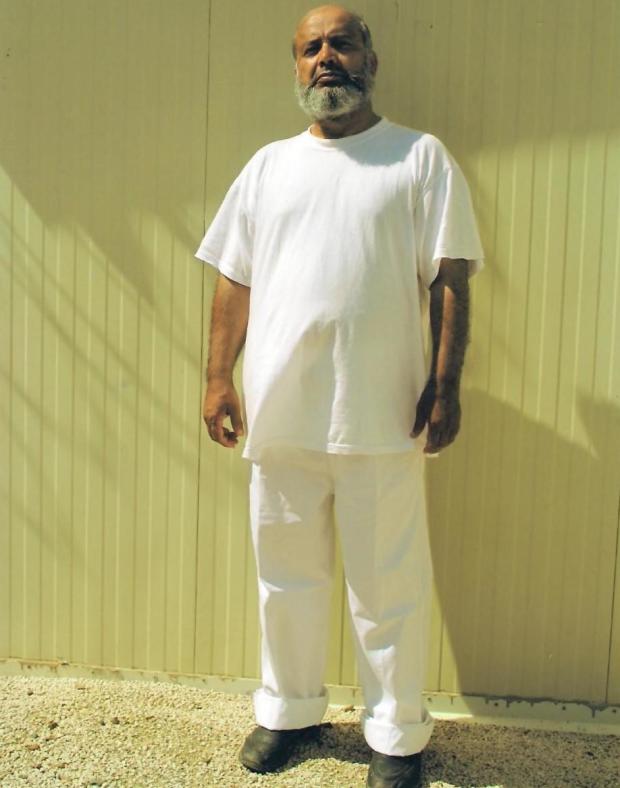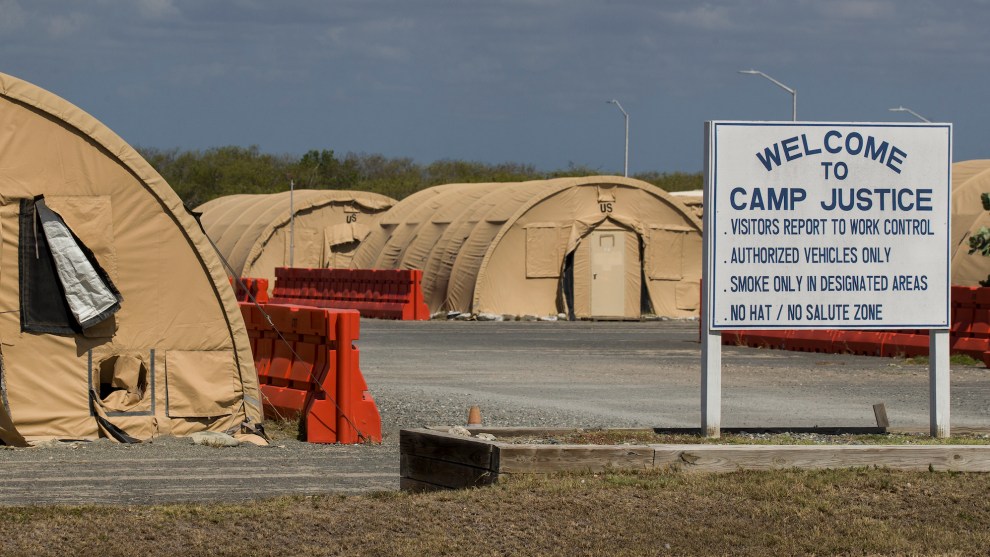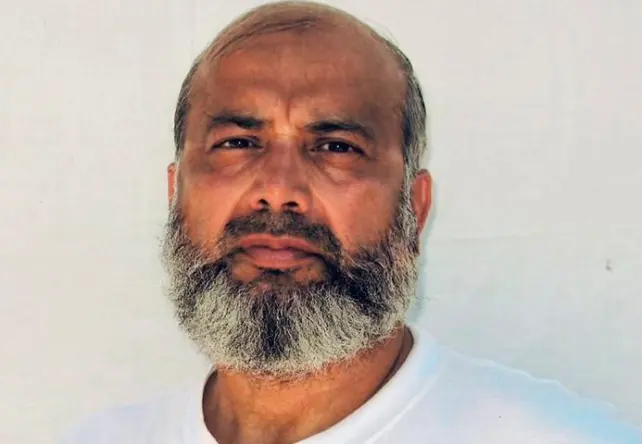CLOSE GUANTANAMO
Oldest Guantanamo Bay prisoner transferred to Pakistan after 17 years in custody, U.S. saysOCTOBER 29, 2022 / CBS/AP
A 75-year-old from Pakistan who was the oldest prisoner at the Guantanamo Bay detention center was released and returned to Pakistan on Saturday, the foreign ministry in Islamabad and the U.S. Defense Department said.
Saifullah Paracha was reunited with his family after more than 17 years in custody in the U.S. base in Cuba, the ministry added.
Paracha had been held on suspicion of ties to al Qaeda since 2003, but was never charged with a crime. In May 2021, he was notified that he had been been approved for release. He was cleared by the prisoner review board, along with two other men in November 2020.

Saifullah Paracha, shown posing for an International Committee of the Red Cross delegate at Guantanamo in an undated photo.
MIAMI HERALD VIA GETTY IMAGES
As is customary, the notification did not provide detailed reasoning for the decision and concluded only that Paracha is "not a continuing threat" to the United States, according to Shelby Sullivan-Bennis, who represented him at his hearing at the time.
The DOD said in its Saturday statement that the U.S. appreciates "the willingness of Pakistan and other partners to support ongoing U.S. efforts focused on responsibly reducing the detainee population and ultimately closing the Guantanamo Bay facility."
In Pakistan, the Ministry of Foreign Affairs, said it had completed an extensive inter-agency process to facilitate Paracha's repatriation.
"We are glad that a Pakistani citizen detained abroad is finally reunited with his family," the ministry said.
Paracha, who lived in the United States and owned property in New York City, was a wealthy businessman in Pakistan. Authorities alleged he was an al Qaeda "facilitator" who helped two of the conspirators in the Sept. 11 plot with a financial transaction.
He has maintained that he didn't know they were al Qaeda and denied any involvement in terrorism.
The U.S. captured Paracha in Thailand in 2003 and held him at Guantanamo since September 2004. Washington has long asserted that it can hold detainees indefinitely without charge under the international laws of war.
In November 2020, Paracha, who suffers from a number of ailments, including diabetes and a heart condition, made his eighth appearance before the review board, which was established under President Barack Obama to try to prevent the release of prisoners who authorities believed might engage in anti-U.S. hostilities upon their release from Guantanamo.
At the time, his attorney, Sullivan-Bennis, said she was more optimistic about his prospects because of President Joe Biden's election, Paracha's ill health and developments in a legal case involving his son, Uzair Paracha.
The son was convicted in 2005 in federal court in New York of providing support to terrorism, based in part on testimony from the same witnesses held at Guantanamo whom the U.S. relied on to justify holding the father.
In March 2020, after a judge threw out those witness accounts and the U.S. government decided not to seek a new trial, the younger Paracha was released and sent back to Pakistan.
In its statement on the elder Paracha's repatriation, the DOD said 35 detainees remain at Guantanamo Bay as of Saturday, and that 20 of them are eligible for transfer.
Five prisoners there who have been charged for their roles in the 9/11 attacks are negotiating potential plea deals that could take the death penalty off the table and keep the detention camp at the military base in Cuba open for the foreseeable future, CBS News reported last month. The possible plea deals angered some victims' families, who said they want justice over closure.
The number of prisoners at Guantanamo has, however, diminished in recent months, as several have been transferred elsewhere. In March, Mohammad Mani Ahmad al-Qahtani, who had been linked to 9/11, was sent to Saudi Arabia, and the following month, Sufyian Barhoumi, who was accused of being an extremist, was repatriated to Algeria after spending nearly 20 years in the detention center. In July, a review board determined that Khalid Ahmed Qasim, known as one of Guantanamo's "forever prisoners," should be released to an undetermined country.
As is customary, the notification did not provide detailed reasoning for the decision and concluded only that Paracha is "not a continuing threat" to the United States, according to Shelby Sullivan-Bennis, who represented him at his hearing at the time.
The DOD said in its Saturday statement that the U.S. appreciates "the willingness of Pakistan and other partners to support ongoing U.S. efforts focused on responsibly reducing the detainee population and ultimately closing the Guantanamo Bay facility."
In Pakistan, the Ministry of Foreign Affairs, said it had completed an extensive inter-agency process to facilitate Paracha's repatriation.
"We are glad that a Pakistani citizen detained abroad is finally reunited with his family," the ministry said.
Paracha, who lived in the United States and owned property in New York City, was a wealthy businessman in Pakistan. Authorities alleged he was an al Qaeda "facilitator" who helped two of the conspirators in the Sept. 11 plot with a financial transaction.
He has maintained that he didn't know they were al Qaeda and denied any involvement in terrorism.
The U.S. captured Paracha in Thailand in 2003 and held him at Guantanamo since September 2004. Washington has long asserted that it can hold detainees indefinitely without charge under the international laws of war.
In November 2020, Paracha, who suffers from a number of ailments, including diabetes and a heart condition, made his eighth appearance before the review board, which was established under President Barack Obama to try to prevent the release of prisoners who authorities believed might engage in anti-U.S. hostilities upon their release from Guantanamo.
At the time, his attorney, Sullivan-Bennis, said she was more optimistic about his prospects because of President Joe Biden's election, Paracha's ill health and developments in a legal case involving his son, Uzair Paracha.
The son was convicted in 2005 in federal court in New York of providing support to terrorism, based in part on testimony from the same witnesses held at Guantanamo whom the U.S. relied on to justify holding the father.
In March 2020, after a judge threw out those witness accounts and the U.S. government decided not to seek a new trial, the younger Paracha was released and sent back to Pakistan.
In its statement on the elder Paracha's repatriation, the DOD said 35 detainees remain at Guantanamo Bay as of Saturday, and that 20 of them are eligible for transfer.
Five prisoners there who have been charged for their roles in the 9/11 attacks are negotiating potential plea deals that could take the death penalty off the table and keep the detention camp at the military base in Cuba open for the foreseeable future, CBS News reported last month. The possible plea deals angered some victims' families, who said they want justice over closure.
The number of prisoners at Guantanamo has, however, diminished in recent months, as several have been transferred elsewhere. In March, Mohammad Mani Ahmad al-Qahtani, who had been linked to 9/11, was sent to Saudi Arabia, and the following month, Sufyian Barhoumi, who was accused of being an extremist, was repatriated to Algeria after spending nearly 20 years in the detention center. In July, a review board determined that Khalid Ahmed Qasim, known as one of Guantanamo's "forever prisoners," should be released to an undetermined country.
US Finally Releases 75-Year-Old Guantanamo Bay Inmate
The detention center for the “worst of the worst” is becoming an assisted living facility.
STEPHANIE MENCIMER
Tents used for overflow housing for Office of Military Commissions personnel at Camp Justice, in Guantanamo Bay Naval Base, Cuba. Alex Brandon/AP Photo
The Guantanamo Bay detention center isn’t anyone’s idea of an assisted living facility. But the controversial prison that former defense secretary Donald Rumsfeld declared in 2002 would hold “the worst of the worst” terrorism suspects has been open for so long that many inmates are now elderly people with health problems. Today, the Biden administration finally released the oldest prisoner, a 75-year-old Pakistani man, Saifullah Paracha, and returned him to Pakistan. Paracha, once a wealthy businessman who lived in New York City, had been at the Cuban base since 2003, when the US government “captured” him in Thailand. He was never charged with a crime.
According to the Associated Press, Paracha suffers from diabetes and heart problems, among other ailments, and is in such poor health that the government says he is “not a continuing threat” to the US. It’s not clear that Paracha was ever a threat to the US. His son Uzair Paracha, then 23, was convicted in the US in 2005 of providing material support for terrorism, in a prosecution based on the same witnesses who provided the basis for holding his father in Cuba. In 2020, a federal judge threw out those witness statements in his case, largely because the government had withheld exculpatory material about them from Uzair’s lawyers, and Uzair was returned to Pakistan.

Saifullah Paracha at the Guantanamo Bay detention center.
Counsel to Saifullah Paracha / AP
Those witnesses, also held at Guantanamo, included people the CIA tortured and waterboarded, notably Khalid Sheik Mohammed, the man the government accuses of masterminding the 9/11 attacks on the World Trade Center. After nearly 20 years in US custody, first in a secret prison, then at Guantanamo, KSM will finally stand trial for his alleged role in 9/11 early next month. (He’s not as old as Paracha, but at 57, KSM has reached the age of AARP membership eligibility.)
In 2003, the Guantanamo detention center held more than 700 people that the George W. Bush administration alleged could be held indefinitely without trial because the military base was on foreign soil. President Barack Obama tried to close the facility but struggled to find countries to take many of the inmates, particularly a group of 17 innocent Uyghurs who hadn’t commit any crimes but did not want to return to their home country of China, where the Turkic language-speaking Muslims were sure to be persecuted. In 2008, a federal judge required the Bush administration to resettle them in the US, and they were headed to a small Uyghur community in Northern Virginia before Republicans blocked the transfer. They ended being sent to Palau, an island doomed by climate change to be underwater soon.
Obama did manage to whittle down the population at Guantanamo before President Donald Trump stopped the process. President Joe Biden has resumed the effort to shut down the detention center. In April, the administration released an Algerian detainee who’d spent 20 years at Guantanamo. His release came 14 years after the government had dropped all terrorism charges against him and six years after he’d been cleared for release to Algeria. There are now 35 inmates at the Cuban naval base, 20 of whom have been cleared for release.
The detention center for the “worst of the worst” is becoming an assisted living facility.
STEPHANIE MENCIMER
Senior Reporter
Mother Jones

Tents used for overflow housing for Office of Military Commissions personnel at Camp Justice, in Guantanamo Bay Naval Base, Cuba. Alex Brandon/AP Photo
The Guantanamo Bay detention center isn’t anyone’s idea of an assisted living facility. But the controversial prison that former defense secretary Donald Rumsfeld declared in 2002 would hold “the worst of the worst” terrorism suspects has been open for so long that many inmates are now elderly people with health problems. Today, the Biden administration finally released the oldest prisoner, a 75-year-old Pakistani man, Saifullah Paracha, and returned him to Pakistan. Paracha, once a wealthy businessman who lived in New York City, had been at the Cuban base since 2003, when the US government “captured” him in Thailand. He was never charged with a crime.
According to the Associated Press, Paracha suffers from diabetes and heart problems, among other ailments, and is in such poor health that the government says he is “not a continuing threat” to the US. It’s not clear that Paracha was ever a threat to the US. His son Uzair Paracha, then 23, was convicted in the US in 2005 of providing material support for terrorism, in a prosecution based on the same witnesses who provided the basis for holding his father in Cuba. In 2020, a federal judge threw out those witness statements in his case, largely because the government had withheld exculpatory material about them from Uzair’s lawyers, and Uzair was returned to Pakistan.

Saifullah Paracha at the Guantanamo Bay detention center.
Counsel to Saifullah Paracha / AP
Those witnesses, also held at Guantanamo, included people the CIA tortured and waterboarded, notably Khalid Sheik Mohammed, the man the government accuses of masterminding the 9/11 attacks on the World Trade Center. After nearly 20 years in US custody, first in a secret prison, then at Guantanamo, KSM will finally stand trial for his alleged role in 9/11 early next month. (He’s not as old as Paracha, but at 57, KSM has reached the age of AARP membership eligibility.)
In 2003, the Guantanamo detention center held more than 700 people that the George W. Bush administration alleged could be held indefinitely without trial because the military base was on foreign soil. President Barack Obama tried to close the facility but struggled to find countries to take many of the inmates, particularly a group of 17 innocent Uyghurs who hadn’t commit any crimes but did not want to return to their home country of China, where the Turkic language-speaking Muslims were sure to be persecuted. In 2008, a federal judge required the Bush administration to resettle them in the US, and they were headed to a small Uyghur community in Northern Virginia before Republicans blocked the transfer. They ended being sent to Palau, an island doomed by climate change to be underwater soon.
Obama did manage to whittle down the population at Guantanamo before President Donald Trump stopped the process. President Joe Biden has resumed the effort to shut down the detention center. In April, the administration released an Algerian detainee who’d spent 20 years at Guantanamo. His release came 14 years after the government had dropped all terrorism charges against him and six years after he’d been cleared for release to Algeria. There are now 35 inmates at the Cuban naval base, 20 of whom have been cleared for release.
No comments:
Post a Comment